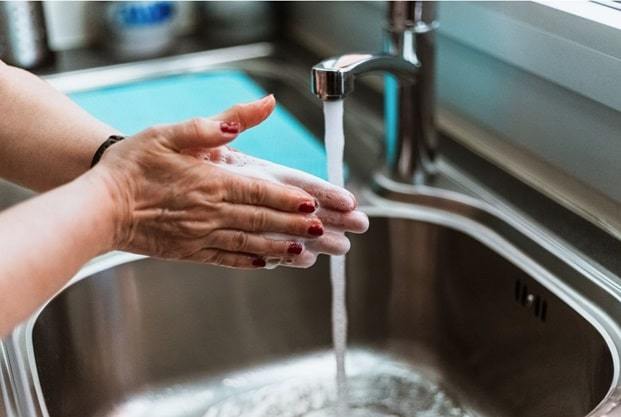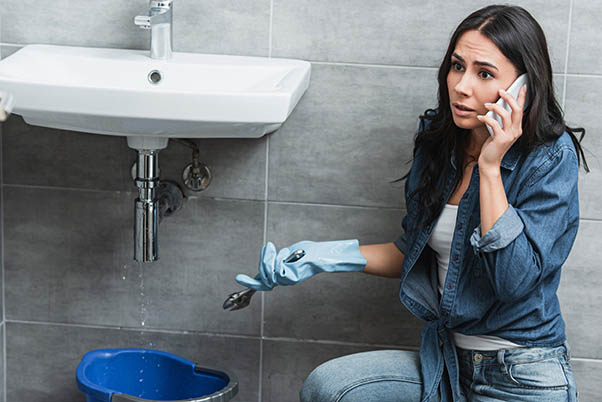Here underneath yow will discover a bunch of superb news pertaining to Expert Tips for Managing a Plumbing Emergency Until Help Arrives.

Pipes emergency situations can strike any time, causing tension and prospective damages to your home. Whether it's a ruptured pipeline, a clogged drainpipe, or a leaky faucet, knowing exactly how to handle the circumstance up until an expert plumbing professional gets here can conserve you from further complications. This article provides important emergency plumbing suggestions to assist you alleviate damages and gain back control during a plumbing crisis.
Turn Off the Supply Of Water
The initial step in any type of plumbing emergency is to shut off the supply of water. For localized issues, such as a leaking faucet or commode, switch off the shutoff near the component. In the case of a major leak or ruptured pipeline, find your home's primary water shut-off valve and turn it off instantly. Knowing the location of these shutoffs ahead of time can conserve useful time throughout an emergency situation.
Turn off Your Hot Water Heater
In particular emergency situations, such as a burst pipe, it's wise to shut down your hot water heater. This stops overheating or damage to the unit when water quits streaming. Shut off the power supply to the water heater (electrical or gas) and allow it cool off to avoid possible dangers.
Temporarily Quit a Burst Pipeline
A burst pipeline can result in substantial water damage in mins. To reduce the issue:
Call a professional plumbing technician immediately to attend to the problem permanently.
Have an Emergency Situation Plumbing Package
Prepare a basic plumbing emergency situation kit to manage small problems properly. Your package should include:
Having these tools available can make a substantial distinction in your ability to handle emergencies.
Unclog Drains Securely.
A clogged drain can be a discouraging and unpleasant issue. Right here's exactly how to tackle it:.
If these approaches do not work, prevent utilizing excessive force, as it may get worse the clog.
Take Care Of Overflowing Toilets.
An overruning bathroom can trigger immediate chaos. Here's what you must do:.
Address Tiny Leakages with Short-term Fixes.
Tiny leaks can quickly come to be considerable problems if left uncontrolled. Utilize these temporary solutions up until professional aid arrives:.
While these solutions aren't permanent, they can assist decrease water loss and damage.
Manage Frozen Pipes Thoroughly.
In cooler climates, frozen pipelines are an usual emergency. If you presume a frozen pipe:.
Know When to Call a Professional.
While quick fixes can assist briefly, particular pipes issues require instant expert attention. Call a plumbing technician if:.
Immediately speaking to a specialist ensures the problem is solved appropriately and prevents more difficulties.
Prevent Further Damages.
Taking fast activity to decrease damages can conserve you money and time over time. Here's how:.
Final thought.
Plumbing emergencies can be frustrating, however with the best knowledge and tools, you can take care of the circumstance efficiently until aid gets here. By shutting off the supply of water, addressing tiny leakages, and using temporary solutions, you can lessen damage and maintain your home safe. Keep in mind, these tips are short-lived options; always get in touch with an accredited plumbing to handle the origin of the issue. Prep work and quick reasoning are your finest allies in any pipes emergency.
Expert Tips for Emergency Plumbing Repairs
Plumbing emergencies can be incredibly stressful and inconvenient. Whether it’s a burst pipe, a clogged drain, or a leaky faucet, these common plumbing emergencies need immediate attention to prevent further damage to your home. But before you panic, it’s important to understand the basics of plumbing repairs and the steps you can take to address these emergencies. In this article, we will share some expert tips to help you navigate through these situations and minimize potential water damage.
Identifying Common Plumbing Emergencies
Leaky pipes and faucets Clogged drains and toilets Burst pipes Low water pressure Water heater problems Essential Tools for Plumbing Repairs
Plunger: Useful for unclogging toilets and drains Adjustable wrench: Needed for tightening or loosening nuts and bolts Pipe wrench: Ideal for gripping and turning pipes Tape measure: Necessary for accurate pipe measurements Plumber’s tape: Helps create watertight seals Understanding Emergency Plumbing Services
Emergency plumbing services are designed to provide immediate assistance for unexpected plumbing issues that can cause significant damage to your home, business, or health. These services are typically available 24/7 and are staffed by experienced plumbers who can quickly diagnose and repair a wide range of plumbing problems.
When a plumbing emergency strikes, time is of the essence. Whether it’s a burst pipe flooding your basement or a gas leak posing a serious risk, emergency plumbing services ensure that help is just a phone call away. These professionals are equipped with the tools and expertise to handle any situation, minimizing damage and restoring your plumbing system to proper working order.
What Constitutes a Plumbing Emergency?
Burst pipes or water supply lines: These can cause extensive water damage and need immediate repair to prevent flooding. Gas leaks or suspected gas leaks: Gas leaks are extremely dangerous and require prompt attention to avoid potential explosions or health hazards. Sewer backups or overflows: These can lead to unsanitary conditions and significant property damage. Clogged drains or toilets causing water to overflow: Overflowing water can damage floors, walls, and other structures. Leaks or water damage causing structural damage: Persistent leaks can weaken the structural integrity of your home or business. No hot water or heating: A lack of hot water can be more than an inconvenience, especially in colder months. Common Causes of Plumbing Emergencies
Aging or corroded pipes: Over time, pipes can deteriorate, leading to leaks or bursts. Improperly installed or maintained plumbing fixtures: Faulty installations or lack of maintenance can result in unexpected failures. Tree roots or other debris infiltrating your sewer line: Roots can grow into pipes, causing blockages and backups. Frozen pipes or water supply lines: In colder climates, pipes can freeze and burst, leading to significant water damage. High water pressure or sudden changes in water pressure: Excessive pressure can strain pipes and fixtures, causing them to fail. Natural disasters such as floods or earthquakes: These events can disrupt your plumbing system and cause severe damage. Steps to Minimize Water Damage
Locate the water shut-off valve: Knowing where the valve is can help you quickly cut off the water supply to the affected area. Turn off the water heater: If there’s a risk of water coming into contact with the heating element, make sure to turn off the water heater to avoid potential accidents. Open faucets and drain pipes: By opening faucets and drain pipes, you can relieve pressure and empty any standing water. Collect and contain water: Use towels, buckets, or bins to collect water and prevent it from spreading to other areas of your home. https://leecountyplumbingandwellservice.com/expert-tips-for-emergency-plumbing-repairs/

As a devoted person who reads on Expert Tips for Managing a Plumbing Emergency Until Help Arrives, I imagined sharing that piece of content was sensible. Sharing is nice. You just don't know, you might be doing someone a favor. I enjoy your readership.
Click Here